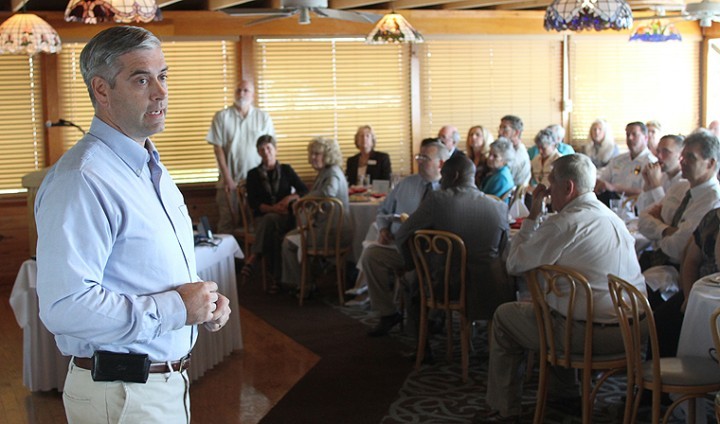
SEBASTIAN — The National Elephant Center presented its plans to a packed room of the Sebastian River Area Chamber of Commerce’s monthly luncheon, laying out how it will convert 223 acres of former citrus groves in Fellsmere into a facility that could help any of the nearly 300 elephants in 70 accredited zoos across the country. The reception was warm and welcoming amongst business leaders.
“I think it’s going to be fabulous,” said LF Staffing representative Lynne Rhodewalt of the National Elephant Center. “This is a worthy cause.”
Rhodewalt said that she was happy to hear that the center would be helping these endangered animals, which she holds near and dear to her heart. She explained that her daughter presented her an “elephant” as a gift – an adoption/sponsorship type program.
“I think it’s exciting,” said Nancy Johnson. She added that she’s interested to see the economic impact the center would have on the area once it’s fully up and running.
Most of all, she’d like to take a tour of the center once the facility is ready for scheduled public tours.
“I’m looking forward to taking my granddaughter there,” Johnson said.
This was the second such presentation Chief Operating Officer Jeff Bolling and Executive Director John Lehnhardt has given about the National Elephant Center in about a week. Last Tuesday, they addressed the Fellsmere Property Owners Association, where they also received a warm welcome.
Lehnhardt walked the members of the Sebastian River Area Chamber of Commerce through the plans and program, explaining that the center – a first of its kind in North America – would serve as a resource for the 70 member accredited zoos, which hold between 290 and 300 elephants nationwide.
Such resources could include temporary housing while zoos expand or rehabilitate elephant enclosures, breeding assistance, and housing of teen male elephants who can no longer stay with their herd and be re-homed at other zoos.
As the center becomes established and grows, the organizers see it as a place for centralized training for elephant keepers, caretakers and veterinarians.
Such a training center – albeit much smaller – currently exists in West Virginia, Bolling said.
Lunch attendees asked several questions about elephants – many of which were already asked by the Fellsmere Property Owners Association attendees.
Focusing more on the business side of the center, Chamber members asked about the center’s estimated annual operating budget, how it would be funded and what impact it would have on the local area as well as on the county.
Lehnhardt said the center will be partially funded by the participating partner zoos to get the center up and running but fundraising, too, would be used to support future growth, including an education and visitors center. Other forms of income could come from selling elephant manure, he added.
As for the economic impact the center could have, Lehnhardt said it wouldn’t have the type of impact associated with a tourist attraction because that’s not what the facility is. However, whatever the impact, it would be local as there would be a full time staff on board, and local businesses tapped to help with construction and providing feed.
“I’m not sure there’s going to be a giant impact,” he said, noting that as the education and visitors center comes online and scheduled tours are conducted, there could be some economic impact from that.
Lehnhardt told the audience that their estimated annual operating budget would be in the neighborhood of $300,000 to $400,000 to start – most of which would go to food for the elephants. He estimated that each elephant would eat approximately $25,000 worth of feed each year.
He noted that elephants’ diets are similar to horses and will be given a variety of grasses and hay to eat.
Others in the audience asked about the potential for odor and noise to come from the center.
“Elephants don’t make a whole lot of noise,” said Bolling, explaining that they don’t trumpet often.
As for the odor, he said he would expect it to dissipate quickly and not smell too different from cattle.
Another in the audience asked what the maximum number of elephants that could be held at the National Elephant Center.
Bolling said that while there would be a total of 36 stalls split evenly between the African elephant side and the Asian elephant side of the center, he does not anticipate filling every stall at any given time.
“I don’t want to take up every stall,” he said, explaining that he’d rather keep a few stalls open so the elephants don’t feel crowded and to provide space for any aggressive elephants.
For more information about the National Elephant Center and its plans in Fellsmere, visit www.TheNationalElephantCenter.org.



